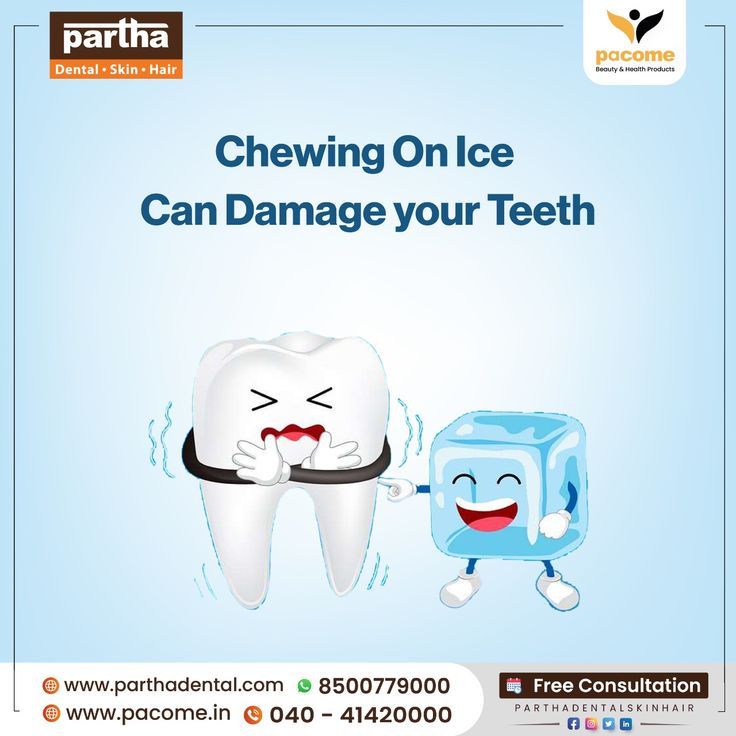Chewing Ice Teeth Damage

The habit of chewing ice, also known as pagophagia, may seem harmless to some, but it can have significant consequences for your oral health. Chewing ice is a common habit, often associated with stress, anxiety, or boredom, but it can lead to severe damage to your teeth and overall oral well-being. In this comprehensive guide, we will delve into the world of chewing ice teeth damage, exploring the causes, effects, and prevention strategies to help you maintain a healthy, beautiful smile.
Understanding the Causes of Chewing Ice
Before we dive into the consequences of chewing ice, it’s essential to understand why people engage in this behavior. Some common reasons include:
- Stress and anxiety: Chewing ice can be a coping mechanism for stress and anxiety, providing a temporary distraction from overwhelming emotions.
- Boredom: People may chew ice out of boredom, often accompanied by other habits like nail biting or pencil chewing.
- Nutritional deficiencies: In some cases, pagophagia can be a sign of underlying nutritional deficiencies, such as iron or zinc deficiency.
- Habit: Chewing ice can become an ingrained habit, often starting in childhood and persisting into adulthood.
The Effects of Chewing Ice on Teeth
Chewing ice can cause significant damage to your teeth, including:
- Tooth wear and tear: The constant crunching and grinding of ice can wear down tooth enamel, leading to a loss of tooth structure and potentially causing sensitivity.
- Chipped or cracked teeth: The intense pressure of chewing ice can cause teeth to chip or crack, especially if you have pre-existing weaknesses in your teeth.
- Tooth fractures: In severe cases, chewing ice can lead to tooth fractures, which can be painful and require extensive dental work to repair.
- Dental work damage: If you have dental work such as fillings, crowns, or bridges, chewing ice can damage these restorations, leading to costly repairs.
Other Consequences of Chewing Ice
In addition to the damage it can cause to your teeth, chewing ice can also have other consequences, including:
- Jaw pain and dysfunction: The constant strain on your jaw muscles can lead to pain and dysfunction, making it difficult to eat, speak, or even sleep.
- Headaches and migraines: The pressure and stress of chewing ice can trigger headaches and migraines, especially if you’re prone to these conditions.
- Digestive issues: Swallowing large amounts of ice can lead to digestive issues, such as stomach pain, nausea, and vomiting.
Breaking the Habit: Prevention Strategies
If you’re a habitual ice chewer, don’t worry – there are ways to break the habit and prevent further damage to your teeth. Here are some strategies to help you overcome pagophagia:
- Identify your triggers: Become aware of the situations, emotions, or events that trigger your ice chewing habit.
- Find alternative habits: Replace ice chewing with healthier habits, such as chewing sugar-free gum, eating sunflower seeds, or engaging in relaxing activities like meditation or deep breathing.
- Keep yourself occupied: Stay busy with activities that keep your hands and mouth engaged, such as puzzles, drawing, or playing a musical instrument.
- Seek professional help: If you’re struggling to break the habit on your own, consider seeking help from a therapist or counselor who can help you address underlying issues.
According to the American Dental Association (ADA), chewing ice can be a sign of an underlying oral health issue. If you're experiencing persistent tooth sensitivity, pain, or other oral health concerns, consult with your dentist to rule out any underlying conditions.
FAQs
Is chewing ice a sign of an underlying health issue?
+Yes, chewing ice can be a sign of an underlying health issue, such as iron deficiency or anxiety. If you're concerned about your ice chewing habit, consult with your doctor or dentist to rule out any underlying conditions.
Can chewing ice cause long-term damage to my teeth?
+Yes, chewing ice can cause long-term damage to your teeth, including tooth wear and tear, chipped or cracked teeth, and tooth fractures. It's essential to break the habit to prevent further damage and maintain good oral health.
How can I prevent myself from chewing ice?
+To prevent yourself from chewing ice, identify your triggers, find alternative habits, keep yourself occupied, and seek professional help if needed. You can also try chewing sugar-free gum, eating sunflower seeds, or engaging in relaxing activities like meditation or deep breathing.
Conclusion
Chewing ice may seem like a harmless habit, but it can have severe consequences for your oral health. By understanding the causes, effects, and prevention strategies, you can break the habit and maintain a healthy, beautiful smile. Remember to stay vigilant, and if you’re concerned about your ice chewing habit, consult with your dentist or doctor to rule out any underlying conditions. With the right mindset and strategies, you can overcome pagophagia and enjoy a lifetime of good oral health.